Many strategies help us change our habits, and four strategies tower above the others: Monitoring, Foundation, Scheduling, and Accountability. They’re so ubiquitous and familiar that it’s easy to take them for granted—but they’re invaluable.
We Manage What We Monitor
The Strategy of Monitoring has an uncanny power. It doesn’t require change, but it often leads to change. To paraphrase a business school truism, “We manage what we monitor,” and keeping close track of our actions means we do better in categories such as eating, drinking, exercising, working, TV and Internet use, spending—and just about anything else. Self-measurement brings self-awareness, and self-awareness strengthens our self-control. Something as simple as a roadside speed display to show motorists how fast they’re going helps them to slow down.
A key step for the Strategy of Monitoring is to identify precisely what action is monitored. Specific habits such as “Read the news every morning” or “Call one client each day” are easy to monitor, while vague resolutions such as “Be more informed” or “Cultivate better client relationships” are hard to monitor. When you cannot express it in number, your knowledge is of a meager and unsatisfactory kind. If we want something to count in our lives, we should figure out a way to count it.
Actual measurement is crucial, because when we guess what we’re doing, we’re often wildly inaccurate. Unsurprisingly, we tend to underestimate how much we eat and overestimate how much we exercise. In one study, people estimated that in the course of daily activities (excluding exercise regimens) they walked about four miles; in fact, most walked less than two miles.
Accurate monitoring helps determine whether a habit is worth the time, money, or energy it consumes. A friend tracked his TV watching because he wanted to know if TV was eating up too much of his day (it was). A woman quit drinking because she figured that in six years she and her husband had spent almost $30,000 on alcohol—money they would’ve preferred to spend on something else. Aaron Beck, founder of cognitive behavioral therapy, maintains that people find it easy to notice what their partners do wrong, but not what they do right, so he suggests keeping “marriage diaries” to track partners’ considerate behavior; one study showed that 70 percent of couples who did this tracking reported an improved relationship.
People who love to self-monitor can join the Quantified Self movement, a community of those who use technology to track every aspect of their daily life and performance—but most of us aren’t ready to make quite such a commitment to the process. Monitoring is valuable, but it’s also time-consuming and a bit tiresome, so monitor only the aspects of your life that really matter.
First Things First
While some experts advise focusing on one habit project at a time to avoid draining willpower, others note that people who work on one positive habit often find it easier to improve in other areas; for instance, people who stick to a program of exercise also show better health- and work-related behaviors. Maybe that’s one reason so many major religions have periods of ritualized self-denial, like Lent, Ramadan, and Yom Kippur. Self-command breeds self-command, and change fosters change. The reverse is true, too: undesirable habits often cluster together and reinforce each other.
If we want to improve our habits, where should we begin? I often remind myself, “First things first.” That is, begin by addressing big, obvious problems.
So where should we start? It’s helpful to begin with habits that most directly strengthen self-control; these habits serve as the Foundation for forming other good habits. They protect us from getting so physically taxed or mentally frazzled that we can’t manage ourselves.
habits in four areas do most to boost feelings of self-control, and in this way strengthen the Foundation of all our habits. We do well to begin by tackling the habits that help us to: 1. Sleep 2. Move 3. Eat and drink right 4. Unclutter.
Foundation habits tend to reinforce each other—for instance, exercise helps people sleep, and sleep helps people do everything better—so they’re a good place to start for any kind of habit change. Furthermore, somewhat mysteriously, Foundation habits sometimes make profound change possible.
If It’s on the Calendar, It Happens
The Strategy of Scheduling, of setting a specific, regular time for an activity to recur, is one of the most familiar and powerful strategies of habit formation. Scheduling makes us far more likely to convert an activity into a habit (well, except for Rebels), so for that reason schedule even some slightly ridiculous habits, such as “Kiss Jamie every morning and every night.”
Habits grow strongest and fastest when they’re repeated in predictable ways, and for most of us, putting an activity on the schedule tends to lock us into doing it. Scheduling also forces us to confront the natural limits of the day. It’s tempting to pretend that I can do everything if only I get the “balance” right, but scheduling requires choices. Scheduling one activity makes that time unavailable for anything else. Which is good—especially for people who have trouble saying no.
To apply the Strategy of Scheduling, we must decide when, and how often, a habit should occur. Generally, advice about habit formation focuses on fixed habits, that is, habits that always happen in the same way, without conscious thought.
An unfixed habit requires more decision making and adjustment: I’m in the habit of going to the gym on Mondays, and I write every day, but every Monday I must decide when to go to the gym, and I must decide when and where I’ll do my daily writing. I try to make my good habits as fixed as possible, because the more consistently I perform an action, the more automatic it becomes, and the fewer decisions it requires; but given the complexities of life, many habits can’t be made completely automatic.
Although many people believe that habits form in twenty-one days, when researchers at University College London examined how long people took to adopt a daily habit, such as drinking water or doing sit-ups, they found that on average, a habit took sixty-six days to form. An average number isn’t very useful, however, because—as we all know from experience—some people adopt habits more easily than others (say, habit-embracing Upholders vs. habit-resisting Rebels), and some habits form more quickly than others. Bad habits can be easy to create, though they make life harder, while good habits can be hard to create, though they make life easier.
We may not be able to form a habit in twenty-one days, but in many situations, we do benefit from scheduling a habit every day. The things we do every day take on a certain beauty, and funnily enough, two very unconventional geniuses wrote about the power of daily repetition. Andy Warhol said, “Either once only, or every day. If you do something once it’s exciting, and if you do it every day it’s exciting. But if you do it, say, twice or just almost every day, it’s not good any more.” Gertrude Stein made a related point: “Anything one does every day is important and imposing.”
Someone’s Watching
To be effective, the Strategy of Scheduling often must be paired with the essential Strategy of Accountability. It’s not enough to schedule a habit; we must actually follow that habit. Accountability means that we face consequences for what we’re doing—even if that consequence is merely the fact that someone else is monitoring us.
Accountability is a powerful factor in habit formation, and a ubiquitous feature in our lives. If we believe that someone’s watching, we behave differently. Deadlines help us keep the habit of working. Late fees help us pay our bills on time. Grades help us study. Attendance records help us get our children to school on time. When we believe that we may be held accountable for our actions—even when we’re accountable only to ourselves—we show more self-command.
This tendency is very marked. In one study, where people were asked voluntarily to pay for the beverages they took from an office kitchen, people paid more honestly when the price list was accompanied by an image of two eyes than when it was accompanied by a flower image; in Boston, when a life-sized cutout of a policeman was placed at a train station’s bicycle cage, bike thefts dropped 67 percent. The mere presence of a mirror—which allows people literally to watch over themselves—makes people more likely to resist bullying, to argue their own opinions, to work harder at tasks, and to resist temptation.
On the flip side, when we don’t feel accountable, we behave worse. The anonymity of hotels and travel makes it easier for people to break a healthy habit or moral code; using a pseudonym makes people more likely to act badly; even the slight disguise of sunglasses makes people feel freer to break their usual standards of conduct.
For this reason, it’s often worthwhile to invest in systems of accountability. A chief benefit of fitness trainers, financial planners, life coaches, executive coaches, personal organizers, and nutritionists, in addition to their expertise, is the accountability they provide.
Another way to create accountability is to go public. In his memoir The Writing of One Novel, novelist Irving Wallace explained, “When you are a free and independent writer, without employer, without hours or deadlines, you have to play little games to force yourself into the actual writing. For me, one game is to announce … that I have finally decided on my next book, that I am ready to write it … to put my pride on the line.”
Another way to harness the Strategy of Accountability is to use a “commitment device,” that is, some mechanism that bolsters our habits by locking us into a decision. We can’t change our minds, or if we do, we’re heavily penalized. The lowly china piggy bank is a child’s commitment device, and adults may open a Christmas account, which levies charges against account holders who withdraw savings before the holiday. According to legend, novelist Victor Hugo’s exotic commitment device was to order his servant to take away his clothing for the day. Left naked in his study, with only paper and pen, Hugo had nothing to do but write.
This kind of commitment device is probably more useful for hitting a limited goal, such as giving up drinking for sixty days or finishing a big report, rather than for tackling a habit change that’s intended to last indefinitely. However, used wisely, it might help to jump-start a long-term habit.


